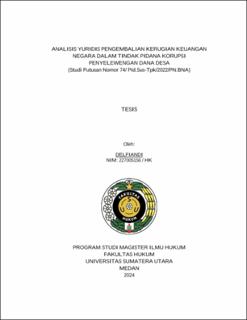| dc.contributor.advisor | Mulyadi, Mahmud | |
| dc.contributor.advisor | Trisna, Wessy | |
| dc.contributor.author | Delfiandi, Delfiandi | |
| dc.date.accessioned | 2025-02-10T04:42:54Z | |
| dc.date.available | 2025-02-10T04:42:54Z | |
| dc.date.issued | 2024 | |
| dc.identifier.uri | https://repositori.usu.ac.id/handle/123456789/101024 | |
| dc.description.abstract | The corruption cases involving Village Heads not only damage public trust in village governance as a representation of regional autonomy but also harm state finances. Therefore, efforts to recover state financial losses due to corruption are crucial for reform. This thesis research formulates several questions: How is the concept of recovering state financial losses in corruption cases based on the anti-corruption legal regime in Indonesia; Can the recovery of state financial losses in cases of corruption involving the misappropriation of village funds by Village Heads be considered a reason to nullify corruption charges if done before investigation; And how do the considerations and judgments of judges who impose penalties on Village Heads, even though they have returned the state financial losses, get analyzed in the verdict of the Banda Aceh District Court Number 74/Pid.Sus-TPK/2022/PN-BNA.
This research is normative legal research and is descriptive in nature. The approaches used are the statutory approach and the case approach. The data utilized are secondary data, collected through literature study methods using document study techniques. The data is then analyzed using qualitative data analysis methods and conclusions are drawn deductively.
The research concludes that the concept of recovering state financial losses within the anti-corruption legal regime in Indonesia serves to uphold justice and acts as an instrument that guarantees legal certainty and provides benefits to the state and society. The nullification of corruption charges upon the recovery of state financial losses before the investigation of the corruption crime can be justified based on substance, structure, and legal culture. Substantively, the formal paradigm has shifted to a material one, where Article 4 of the Anti-Corruption Law should become irrelevant if the state losses have been recovered. The Banda Aceh Corruption Court's decision in case number 74/Pid.Sus-TPK/2022/PN-BNA, which sentenced the Village Head despite the recovery of the financial losses, does not fully meet the objectives of the law. It is suggested that the regulations concerning the recovery of state financial losses need to be reformulated. The verdicts of the Anti-Corruption Court should not focus solely on punishment, as the primary goal of combating corruption is to restore the state's finances and economy, as emphasized in the preamble letters a and b of the Anti-Corruption Law. | en_US |
| dc.language.iso | id | en_US |
| dc.publisher | Universitas Sumatera Utara | en_US |
| dc.subject | Corruption | en_US |
| dc.subject | Recovery of State Financial Losses | en_US |
| dc.subject | Village Funds | en_US |
| dc.title | Analisis Yuridis Pengembalian Kerugian Keuangan Negara dalam Tindak Pidana Korupsi Penyelewengan Dana Desa (Studi Putusan Nomor 74/ Pid.Sus-Tpk/2022/PN.BNA) | en_US |
| dc.title.alternative | Juridical Analysis of State Financial Loss Recovery in Corruption Crimes Involving Misappropriation of Village Funds (Case Study of Decision Number 74/Pid.Sus-Tpk/2022/PN.BNA) | en_US |
| dc.type | Thesis | en_US |
| dc.identifier.nim | NIM227005156 | |
| dc.identifier.nidn | NIDN0001047403 | |
| dc.identifier.nidn | NIDN0123018601 | |
| dc.identifier.kodeprodi | KODEPRODI74101#Ilmu Hukum | |
| dc.description.pages | 146 Pages | en_US |
| dc.description.type | Tesis Magister | en_US |
| dc.subject.sdgs | SDGs 16. Peace, Justice And Strong Institutions | en_US |


